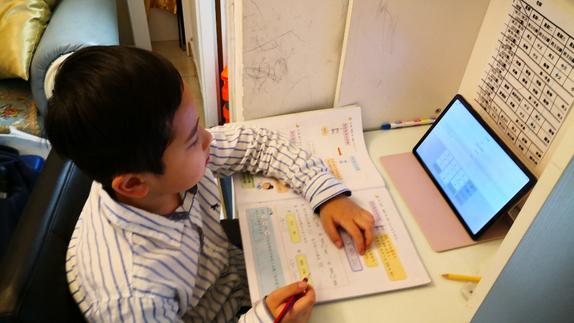 In this undated photo, a pupil engages in an online study course at home. (PHOTO / CHINA DAILY)
In this undated photo, a pupil engages in an online study course at home. (PHOTO / CHINA DAILY)
Facing a prolonged pandemic, many private tutoring centers moved their classes online in a bid to turn a crisis into an opportunity, but some small and midsize ones are still struggling to survive.
Stanley Wong is the founder of a tutoring center in Tuen Mun district. As many of his students are cross-boundary students who currently have to stay in Shenzhen due to the strict travel restrictions, he moved classes online.
Wong said the business was not seriously affected. “Though the number of new students decreased in the new school year, most of the other students didn’t choose to leave.”
In 20 years of teaching, Wong had never had distancing classes for students before the pandemic. “Now, it becomes the only solution,” he said.
According to a survey by market research company Ipsos, in the 2015-16 academic year, there were 1,317 private tutoring companies and 2,051 tutoring centers in Hong Kong providing a service for primary school students, and 1,110 private tutoring companies and 1,775 tutoring centers offering a service for secondary students.
Every time the Education Bureau suspends face-to-face classes, private tutoring schools and centers are also constrained by the guidance.
Every time the Education Bureau suspends face-to-face classes, private tutoring schools and centers are also constrained by the guidance
Large tutoring schools in the city, such as Beacon College and King’s Glory Education Centre, adopted remote teaching and learning amid a suspension of face-to-face classes earlier this year.
Students can collect learning materials in the centers and study at home by watching videos uploaded by the tutorial centers.
READ MORE: HK education chief reveals major changes to liberal studies
However, some small and midsize centers don’t have enough resources to go digital.
In late February, Kwok Hoi-shan and her business partner closed the small education center they ran in a shopping mall in Whampoa, Kowloon.
She said the remote teaching-learning model is not feasible for her students nor for her.
Kwok’s tutoring center used to have around 25 kindergarten and primary school pupils. Teachers at the center would answer students’ questions and provide help when they did homework after school.
As Hong Kong has many half-day kindergartens and primary schools, tutoring centers are indispensable places for dual-career families, as children can stay in the centers and learn till their parents finish work.
ALSO READ: Education Bureau enhances values education at schools
But remote learning requires an adult to be there to supervise the children as many kindergarten and primary school students fidget and cannot control themselves on their own when sitting in front of a screen, Kwok said. “The effect of online classes for my center is little.”
In addition, Kwok believes the center will need to spend more money on solving technical problems and hiring professional teachers to record tutorial videos if they want to move classes to the internet, which will “impose more financial pressure on the center”.
Kwok said she won’t set up a tutoring center again in the immediate future. She urged the government to provide financial or policy support for the city’s small and midsize tutoring centers.


